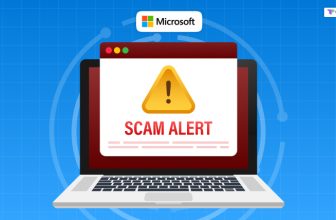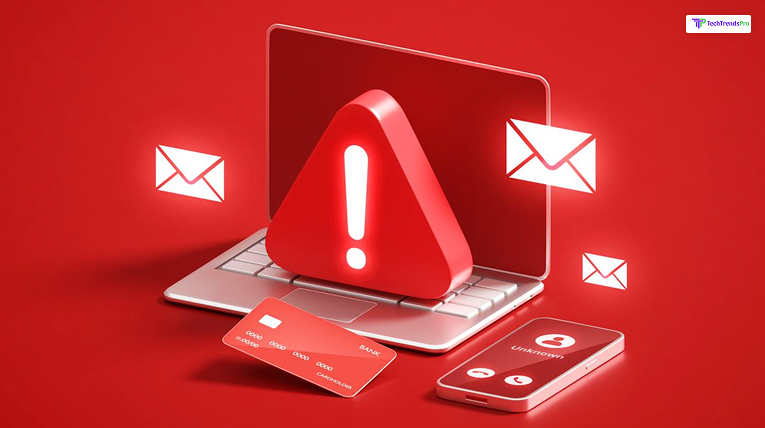
The era of electronic spying and cyber war has witnessed few causes as much disturbance as Pegasus spyware in the cybersecurity landscape.
Initially created by Israeli cyber-intelligence company NSO Group, Pegasus is one of the most sophisticated spyware techniques ever found, with the capability of transforming smartphones into 24/7 spying tools.
It is only recently that the name “Pegasus” has also been employed by phishing email attackers. The emails threaten to trick victims into opening harmful links or disclose sensitive data on the presumption that they are infected with Pegasus spyware.
In this piece, we are telling you all you should know about Pegasus spyware emails, from how the trick works to how to identify it, and how to remain safe.
What Is Pegasus Spyware Email?
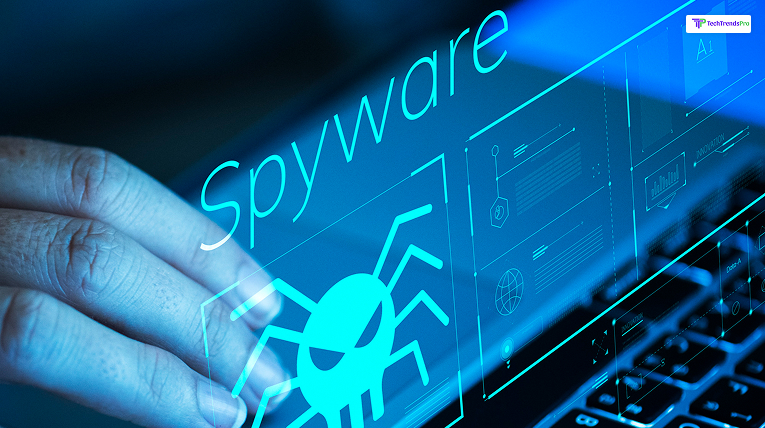
Pegasus is a state-of-the-art spyware agent that is able to infect iPhones and Android mobile phones without any user intervention (zero-click attacks). Once installed, it has the capability of:
- Interceiving calls, messages, images, and emails
- Turning on the camera and microphone
- Locating the phone in real-time
- Hacking app data such as WhatsApp, Telegram, Gmail, and Facebook
It is predominantly utilized by government agencies to monitor journalists, activists, political dissidents, and other groups of interest.
However, cybercriminals now use the Pegasus brand to send phishing emails on their behalf as authorities or security companies, causing panic and confusion in the public.
How Does The Scam Work?
Cyber criminals use fear and negative publicity about Pegasus to construct genuine-looking phishing emails. The emails can alert you that your telephone has a Pegasus infection and then demand that you:
- Tap a link to “scan” or “remove” the spyware
- Pay not to be exposed
- Provide personal details to investigate
- Install the software to repair the problem
They want to phish out sensitive information, send you genuine malware, or request you to send money.
What Should I Do If I’m Being Targeted?
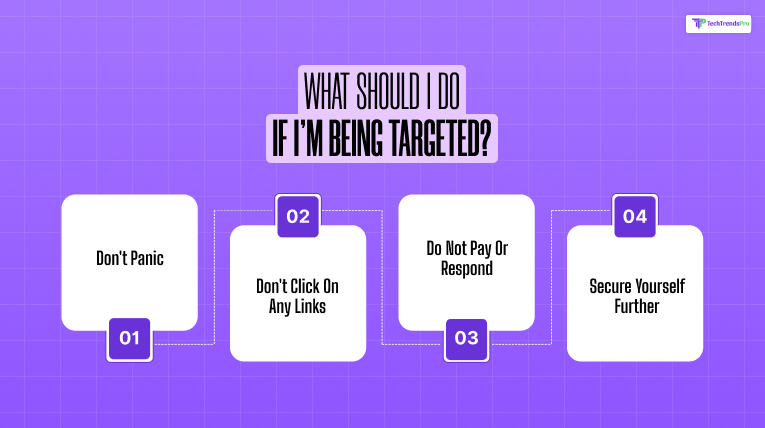
When you are receiving a suspicious mail with Pegasus spyware email as a reference, or are unsure, then adhere to the following very important steps:
1. Don’t Panic
Spammers use fear and urgency. Breathe and keep in mind that actual authorities never warn through random emails.
2. Don’t Click On Any Links
Do not click on any link within the email. They may be a path to impersonation websites that are utilized to steal your data or install viruses.
3. Do Not Pay Or Respond
Don’t respond to the email or contact the sender. If the email is threatening or demanding money, ignore them.
- Report it to your national cybercrime agency or cybersecurity agency.
- Report the email to reportphishing@apwg.org or other anti-phishing agencies.
- Report the email to your email provider and mark it as phishing or spam.
4. Secure Yourself Further
- Update passwords on critical accounts
- Enable two-factor authentication (2FA)
- Scour your device thoroughly for malware using your preferred antivirus software
- Factory reset your device if you think it’s further compromised
How To Identify Pegasus Spyware Email Scam Attacks
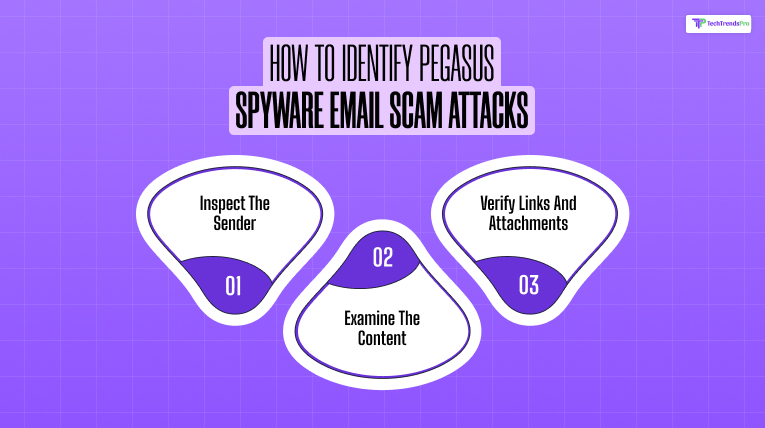
Spam emails have familiar patterns. Here’s what to look out for:
1. Inspect the Sender
· Random or Unfamiliar Domainsns
Scam Pegasus emails usually originate from unrecognized domains, such as security-notice@pegasusalert.com, or free email addresses masquerading as “cybersecurity experts.”
· Surprise Messages
Got an out-of-the-blue warning about spyware with no background information first? That’s questionable.
2. Examine The Content
· Threatening or Alarming Language
Phrases like “Immediate action required”, “Your phone is being monitored”, or “Compliance is not optional and will be legally pursued” are typical ways of intimidating you.
· Request for Payment or Personal Data
Actual cybersecurity notices never ask for your passwords, SSNs, or credit card numbers via email.
· Lack of Personal Tone or Generic Greetings
If the greeting is something like“Dear user” or “Dear customer”, then it is spam. Real services will address you by your actual name.
· Grammar Errors and Spelling Mistakes
Spam messages will contain grammatical errors or spelling errors. Real organizations don’t send emails with such types of errors.
3. Verify Links And Attachments
· Mouse Over Before You Click
Hover over any links to see the target URL beforehand. Scam links are typically brand-name-looking but lead to phishing sites or malicious websites.
· Be Cautious of Suspicious Attachments
Do not download anything from unknown or unverified emails. Attachments may contain keyloggers, trojans, or ransomware.
How To Avoid Pegasus Spyware Email Scam
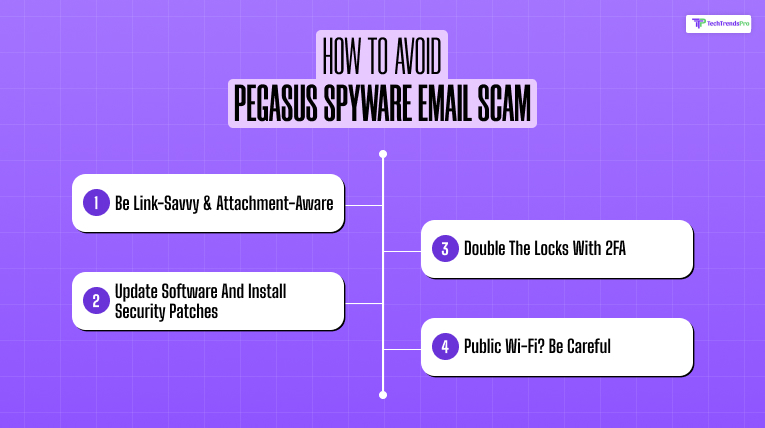
The best defense is to be proactive against phishing attacks.
1. Be Link-Savvy & Attachment-Aware
Be cautious of links from unknown sources. Steer clear of attachments, particularly .exe, .scr, or .zip files.
2. Update Software And Install Security Patches
Old, no-longer-supported programs are a soft target for malware. Update your operating system, browser, and programs with the latest security updates.
3. Double The Locks With 2FA
Activate two-factor authentication on all key accounts (email, finance, social media). It provides an added layer even if login details are compromised.
4. Public Wi-Fi? Be Careful
Do not log into sensitive accounts over public Wi-Fi unless you are logged in to a secure VPN. Public Wi-Fi is a hacker paradise.
Summary: Top Tips To Protect Yourself From Pegasus Spyware Email Scams
| Action | Description |
| Don’t Click | Do not open unknown email attachments and links. |
| Make Passwords Strong | Use strong, unique passwords for each account. |
| Enable 2FA | Enable two-factor authentication where it is offered. |
| Update Software | Install system and app updates on a regular basis. |
| Stay Alert | Research all suspicious or unusual emails. |
| Report Phishing | Help others by reporting phishing attempts. |
Stay Alert From Email Scam!
While Pegasus spyware email itself is a powerful and effective spy software, scams masquerading as Pegasus are a continuously growing threat to the average user.
They employ fear as the lure to lead recipients into taking perilous actions. Being aware of what kind of scams they are, having an understanding of how to identify red flags, and exercising security best practices are your best defenses.
Keep in mind: being informed, watching out, and being on the ball is the ticket to protecting your data and devices in the computer age.
Additional Resources:





